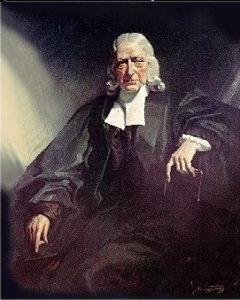Why I Don’t Trust Politics
I consider politics to be a necessary evil.
 Maybe that’s too strong a statement. Someone might reply to me that the Christian message itself has political implications — and they would surely be right. Obviously, the Old Testament prophets — just to cite one obvious example — had a political message about justice and fairness (in addition to a moral message about right and wrong). Jesus’ message of the Kingdom of God finds its roots in the message of the prophets. I’m all in favor of spelling out the political and social aspects of the Christian message. Really. I am.
Maybe that’s too strong a statement. Someone might reply to me that the Christian message itself has political implications — and they would surely be right. Obviously, the Old Testament prophets — just to cite one obvious example — had a political message about justice and fairness (in addition to a moral message about right and wrong). Jesus’ message of the Kingdom of God finds its roots in the message of the prophets. I’m all in favor of spelling out the political and social aspects of the Christian message. Really. I am.
And, politics is unavoidable. Where two or three are gathered together, there — pretty soon — will be politics in their midst. People have differing ideas and goals and agendas. If people gather together to accomplish something, then, soon these differences will arise. Sides will emerge. Issues will emerge. The question will be: who will prevail.
So, while there is national politics, there is also community politics, church politics, and family politics. I know that. And, there is no avoiding it.
But, here’s my problem with it: (more…)
N. T. Wright: Power to Become Children

N. T. Wright
From a sermon by N. T. Wright, preached at Cathedral Church of Durham on Christmas Morning 2007:
Because what we are promised, in that strange phrase at the heart of John’s prologue, is a new kind of power: to all who received him, who believed in his name, he gave power to become children of God. Power to become children! There’s a paradox for you: power to become powerless, authority to be under authority. Ah, people will say, but children of God; yes, but the meaning of the word ‘God’ is now being redefined, in this very paragraph, so that we only really discover who God is when we look at Jesus, Jesus the helpless baby, Jesus the one who reveals God’s glory when he dies on the cross, Jesus the only begotten Son who has revealed the invisible God. And when we hear that gospel word, and discover that something new is happening within us, something is stirring which feels very like faith, and hope, and love, we know that a new kind of life has taken hold on us, meaning that we have indeed been born again, whether a moment before or a lifetime before, have been made new with a life which death cannot touch, a life which will lighten our path through whatever darkness lies ahead, a life which doesn’t spring from mere human possibilities – born, says John, not of blood or of the will of the flesh or of the will of man, but of God. Power to become children: that’s the promise of new birth, full of grace and truth.
“Part of the art of listening to scripture is learning to hear the multiple overtones in a single, simple phrase. And the Word became flesh and lived among us, says John: and we learn, and learn again, every Christmas, to hear in that great and simple statement all the glory of the new world, with its new possibilities: new life in Mary’s womb, new life within the increasingly dangerous public world which does its best to squash the rumour, and new life, please God, in our own hearts and lives and families and work. And the Word became flesh and lived among us. That is what we celebrate today: the new reality which leaves us no longer at ease in the old dispensation, but determined to live and rejoice and be part of his transforming work of new creation, so that though the world declares that it can’t see God and doesn’t know who he is we may declare, in what we are as well as what we say, that God the only Son, the Word made flesh, close to the Father’s heart, has made him known and will make him known. May that be true in us and through us this Christmas time and always.
The rest of the sermon can be found here: Power to Become Children.
Love Your Enemies
From my daily Bible reading:
 “You have heard that it was said, ‘You shall love your neighbor and hate your enemy.’ But I say to you, Love your enemies and pray for those who persecute you, so that you may be children of your Father in heaven; for he makes his sun rise on the evil and on the good, and sends rain on the righteous and on the unrighteous. For if you love those who love you, what reward do you have? Do not even the tax collectors do the same? And if you greet only your brothers and sisters, what more are you doing than others? Do not even the Gentiles do the same? Be perfect, therefore, as your heavenly Father is perfect.” — Matthew 5:43-48 NRSV.
“You have heard that it was said, ‘You shall love your neighbor and hate your enemy.’ But I say to you, Love your enemies and pray for those who persecute you, so that you may be children of your Father in heaven; for he makes his sun rise on the evil and on the good, and sends rain on the righteous and on the unrighteous. For if you love those who love you, what reward do you have? Do not even the tax collectors do the same? And if you greet only your brothers and sisters, what more are you doing than others? Do not even the Gentiles do the same? Be perfect, therefore, as your heavenly Father is perfect.” — Matthew 5:43-48 NRSV.
“Love your enemies. This is the most sublime piece of morality ever given to man. Has it appeared unreasonable and absurd to some? It has. And why? Because it is natural to man to avenge himself, and plague those who plague him; and he will ever find abundant excuse for his conduct, in the repeated evils he receives from others; for men are naturally hostile to each other. Jesus Christ design’s to make men happy. Now he is necessarily miserable who hates another. Our Lord prohibits that only which, from its nature, is opposed to man’s happiness. This is therefore one of the most reasonable precepts in the universe. But who can obey it? None but he who has the mind of Christ. But I have it not. Seek it from God; it is that kingdom of heaven which Christ came to establish upon earth. See on chap. iii. 2. This one precept is a sufficient proof of the holiness of the Gospel, and of the truth of the Christian religion. Every false religion flatters man, and accommodates itself to his pride and his passions. None but God could have imposed a yoke so contrary to self-love; and nothing but the supreme eternal love can enable men to practice a precept so insupportable to corrupt nature. Sentiments like this are found among Asiatic writers, and in select cases were strongly applied; but as a general command this was never given by them, or any other people. It is not an absolute command in any of the books which they consider to be Divinely inspired.” (more…)
A Savior
From my daily Bible reading:
 “She will bear a son, and you are to name him Jesus, for he will save his people from their sins.” — Matthew 1:21 (NRSV).
“She will bear a son, and you are to name him Jesus, for he will save his people from their sins.” — Matthew 1:21 (NRSV).
JESUS. The same as Joshua, יהושע Yehoshua, from ישע yasha, he saved, delivered, put in a state of safety. See on Exod. xiii. 9; Num. xiii. 16….
This shall be his great business in the world: the great errand on which he is come, viz. to make an atonement for, and to destroy, sin: deliverance from all the power, guilt, and pollution of sin, is the privilege of every believer in Christ Jesus. Less than this is not spoken of in the Gospel; and less than this would be unbecoming the Gospel. The perfection of the Gospel system is not that it makes allowances for sin, but that it makes an atonement for it: not that it tolerates sin, but that it destroys it.
— Comments by Adam Clarke (1762-1832).
A House of Prayer for All Nations
In Mark 11 we read that when Jesus entered Jerusalem — that final time — he “entered the temple and began to drive out those who were selling and those who were buying in the temple, and he overturned the tables of the money changers and the seats of those who sold doves; and he would not allow anyone to carry anything through the temple.” It was a provocative thing to do. Mark tells us that this incident is one of the primary reasons the religious leaders wanted to kill Jesus. It was a strong protest against the way religious service was being conducted.
And, then come these remarkable words:
He was teaching and saying, “Is it not written, ‘My house shall be called a house of prayer for all the nations’? But you have made it a den of robbers.”
And, as I read this passage I say to myself: if that was the case then, how much more now! Our various places of worship — wherever they may be — are intended to be places of prayer for all people. They are meant to point to God. They are meant to bring people into connection with God. They are meant for all people. Is that what they are? (more…)
The End of My Blog Break? Maybe
 I don’t apologize for taking blog breaks — and I’m not now — but, I must admit, this has been a rather extended one. My last post here was in May. So, I’ve been away a lot longer than usual. I am often too busy in the summer to spend much time on the Internet — though I find it intellectually stimulating at other times. I like to work outside at various gardening projects when the weather permits. I spend more time outside, just generally. I often fill pulpits in the summer. I just don’t have time for Internet activities.
I don’t apologize for taking blog breaks — and I’m not now — but, I must admit, this has been a rather extended one. My last post here was in May. So, I’ve been away a lot longer than usual. I am often too busy in the summer to spend much time on the Internet — though I find it intellectually stimulating at other times. I like to work outside at various gardening projects when the weather permits. I spend more time outside, just generally. I often fill pulpits in the summer. I just don’t have time for Internet activities.
But, this time, there was something more. I just got to feeling like I didn’t have anything to say. (more…)
Ministry is Servanthood – Colossians 1:25
As I mentioned before, in Colossians 1:24-29, the apostle Paul talks about his own ministry.
![]() In verse 24 he talks he says “I am completing what is lacking in Christ’s afflictions for the sake of his body, that is, the church.” I have commented on that verse here: Sufferings for Christ’s Sake. Now he goes on to talk about his ministry in terms of servanthood.
In verse 24 he talks he says “I am completing what is lacking in Christ’s afflictions for the sake of his body, that is, the church.” I have commented on that verse here: Sufferings for Christ’s Sake. Now he goes on to talk about his ministry in terms of servanthood.
I have sometimes encountered resistance to the idea of the “Servant Leader.” A colleague in the ministry, many years ago, was contemptuous of the idea. If you are the leader, you are in charge — that was his point of view. If you were a servant you served at the wishes of those were in authority. To him, it was a matter of who gave orders, and who served. Yet, in the New Testament, both Jesus and the apostle Paul take a very different view. Jesus said: “You know that the rulers of the Gentiles lord it over them, and their great ones are tyrants over them. It will not be so among you; but whoever wishes to be great among you must be your servant, and whoever wishes to be first among you must be your slave; just as the Son of Man came not to be served but to serve, and to give his life a ransom for many.” (Matthew 20:25-28 NRSV). It seems strange to me that my old colleague in ministry could not wrap his head around this principle from the teaching of Jesus. But, it is clear that the apostle Paul also subscribed to this view. To him, true leadership was also a form of servanthood. (more…)
Sufferings for Christ’s Sake – Colossians 1:24
 In Colossians chapter 1, verses 24-29, the apostle Paul talks about his own ministry.
In Colossians chapter 1, verses 24-29, the apostle Paul talks about his own ministry.
I find passages like this some of the most interesting parts of Paul’s letters. Here we see his motives in ministry. Here we see what kept him going. Paul is often very open about his discouragements and failures, as well as his successes. In that regard, I have always found 2 Corinthians interesting as well. Here we get to see the apostle’s motivations, his discouragements, his goals.
In the verses before, he has dealt with more theological issues — though these are issues which have very serious bearing on their lives. He writes to correct misconceptions which have become prevalent in the Colossian church. He believes that ideas influence behavior — and that is why is is so often concerned to correct mistaken theological ideas. (more…)
A Prayer
Expecting the Guidance of the Holy Spirit
I think that many times in the past I prayed for the guidance of the Holy Spirit — but without a clear expectation in my mind that I would have it in the course of the day.
But, I have learned to expect the Spirit’s guidance — if, indeed, I have prayed for it.
The great preacher F. B. Meyer expresses it well:
Expect the Holy Ghost to work in, with and for you. When a man is right with God, God will freely use him. There will rise up within him impulses and inspirations, strong strivings, strange resolves. These must be tested by Scripture and prayer, and if evidently of God they must be obeyed. But there is this perennial source of comfort: God’s commands are enablings. He will never give us a work to do without showing exactly how and when to do it, and He will give the precise strength and wisdom we need. Do not dread to enter this life because you fear that God will ask you to do something you cannot do. He will never do that. If He lays aught on your heart, He will do so uninvited; as you pray about it the impression will continue to grow, so that presently, as you look up to know what He wills you to say or do, the way will suddenly open, and you will probably have said the word or done the deed almost unconsciously. Rely on the Holy Ghost to go before you to make the crooked places straight and the rough places smooth. Do not bring the legal spirit of ‘must’ into God’s free service. ‘Consider the lilies of the field, how they grow.’ Let your life be as effortless as theirs, because your faith shall constantly hand over all difficulties and responsibilities to your ever-present Lord. There is no effort to the branch in putting forth the swelling clusters of grapes — the effort would be to keep them back.
— F. B. Meyer, quoted by Daniel Steele here: TESTINGS OF THE HOLY SPIRIT. (more…)
The In-Breathing of the Spirit (John 20:22)
“When it was evening on that day, the first day of the week, and the doors of the house where the disciples had met were locked for fear of the Jews, Jesus came and stood among them and said, “Peace be with you.” After he said this, he showed them his hands and his side. Then the disciples rejoiced when they saw the Lord. Jesus said to them again, “Peace be with you. As the Father has sent me, so I send you.” When he had said this, he breathed on them and said to them, “Receive the Holy Spirit.””— John 20:19-22 (NRSV).
 Jack Levison’s new book 40 Days With the Holy Spirit is filled with insights about the Holy Spirit. The book is divided into several brief meditations on the Spirit — and the language the Scriptures use to speak of the Spirit’s role. Dr. Levison holds the W. J. A. Power Chair of Biblical Hebrew and Old Testament Interpretation at Perkins School of Theology, Southern Methodist University. He has written about the Holy Spirit before: The Spirit in First Century Judaism (1997), Of Two Minds: Ecstasy and Inspired Interpretation in the New Testament World (2000), Filled with the Spirit (2009), Fresh Air: The Holy Spirit for an Inspired Life (2012).
Jack Levison’s new book 40 Days With the Holy Spirit is filled with insights about the Holy Spirit. The book is divided into several brief meditations on the Spirit — and the language the Scriptures use to speak of the Spirit’s role. Dr. Levison holds the W. J. A. Power Chair of Biblical Hebrew and Old Testament Interpretation at Perkins School of Theology, Southern Methodist University. He has written about the Holy Spirit before: The Spirit in First Century Judaism (1997), Of Two Minds: Ecstasy and Inspired Interpretation in the New Testament World (2000), Filled with the Spirit (2009), Fresh Air: The Holy Spirit for an Inspired Life (2012).
And, in reading this new book, I came across a insight about the passage above that was new to me. I am quite familiar with the passage that reads: “When he had said this, he breathed on them and said to them, “Receive the Holy Spirit.”” Some scholars call this the Johannine Pentecost — the Gospel of John’s way of speaking of the coming of the Holy Spirit into the lives of the Christian believers. More traditional believers have had some difficulty reconciling this bestowal of the Holy Spirit with the later event of Pentecost — wondering when the Spirit really came upon the first disciples of Jesus. (more…)
Wesley: Two Paths
From long experience and observation I am inclined to think, that whoever finds redemption in the blood of Jesus, whoever is justified, has then the choice of walking in the higher or the lower path. I believe the Holy Spirit at that time sets before him the ‘more excellent way,’ and incites him to walk therein; to choose the narrowest path in the narrow way; to aspire after the heights and depths of holiness, — after the entire image of God. But if he does not accept this offer, he insensibly declines into the lower order of Christians. He still goes on in what may be called a good way, serving God in his degree, and finds mercy in the close of life, through the blood of the covenant.
I would be far from quenching the smoking, flax, — from discouraging, those that serve God in a low degree. But I could not wish them to stop here: I would encourage them to come up higher. Without thundering hell and damnation in their ears, without condemning the way wherein they were, telling them it is the way that leads to destruction, I will endeavor to point out to them what is, in every respect, ‘a more excellent way.’
— John Wesley, Sermon 89 “The More Excellent Way.”
The Angel’s Announcement – Luke 1:26-38
 When we approach Christmas time we naturally have to turn to the Gospel of Luke. It is Luke that tells us the familiar Christmas story that we remember at this time of the year. The Gospel of Mark begins its story with John the Baptist. The Gospel of John talks about creation and the Word and “the Word made flesh.” The Gospel of Matthew tells us a story that centers on Joseph. It is Luke alone that tell us the nativity story upon which the church Christmas pageants and celebrations are based.
When we approach Christmas time we naturally have to turn to the Gospel of Luke. It is Luke that tells us the familiar Christmas story that we remember at this time of the year. The Gospel of Mark begins its story with John the Baptist. The Gospel of John talks about creation and the Word and “the Word made flesh.” The Gospel of Matthew tells us a story that centers on Joseph. It is Luke alone that tell us the nativity story upon which the church Christmas pageants and celebrations are based.
So the Revised Common Lectionary — which tries to assign only one of the Synoptic Gospels to a particular year — nonetheless has to draw from the Gospel of Luke as Christmas rolls around again. So, recommended for this coming Sunday, is the story of the angel’s announcement to Mary of the birth of the savior. (more…)
The Anointed Preacher – Isaiah 61:1–4
 We are told in the Gospel of Luke 4:16-19 that when Jesus had opportunity to speak to the synagogue in Nazareth, he read from the scroll the words of Isaiah 61:1-2 and announced: “Today this scripture has been fulfilled in your hearing.” (Luke 4:21). These verses in Isaiah described Jesus’ mission in life.
We are told in the Gospel of Luke 4:16-19 that when Jesus had opportunity to speak to the synagogue in Nazareth, he read from the scroll the words of Isaiah 61:1-2 and announced: “Today this scripture has been fulfilled in your hearing.” (Luke 4:21). These verses in Isaiah described Jesus’ mission in life.
These ancient words speak to us today of the vocation of the preacher — then and now. When we first come to these verses in the prophecy of Isaiah (or Third Isaiah or whatever his name was) we immediately wonder: who is the prophet talking about? Is this the writer’s mission or is he speaking of someone else? Questions like this might not arise if it weren’t for the fact that the prophecies of the book of Isaiah can be quite mysterious that way. Who is the suffering servant of Isaiah 53? Who is the “servant” of Isaiah 42:1? Who is the figure spoken of in Isaiah 11:2? Who is speaking in Isaiah 48:16? You see what I’m saying.
Salvation Can Be Lost
A List of Scriptures that Teach or Imply that Christian Salvation can be Lost.
WARNING: This is a very long list of Scripture passages, along with some comments from myself and a few historic Bible commentators. Don’t expect to read this straight through in one sitting. (The imagery of salvation being “lost” is also a bit problematic. The idea here is not “lost” in the sense of inadvertently misplaced, but “lost” in the sense of forfeited.) Obviously, these Scriptures are a beginning point for the discussion of these issues. My point is how pervasive this theme really is. Quotes are given from historic commentators with differing perspectives — some Arminian, some more Calvinistic — again, the point is the pervasiveness of this theme.
The Bible warns us time and time again about the danger of falling away from the faith. The following list of Scriptures is by no means complete or exhaustive. Much of the the New Testament can be quoted against the “once-saved-always-saved” doctrine. (more…)




